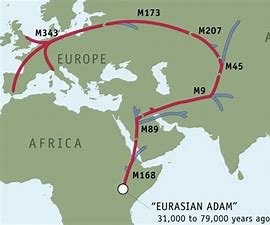For centuries, genealogists have struggled to research paper records. Recently, an explosion of available electronic data has accompanied the advent of the Internet. As a result, web sites like this and enormous on-line resources have made the researcher’s task far more efficient. All of this increase in efficiency, however, still depends on man-made records, notoriously prone to transcription and other human errors.
Today, a new genealogy tool is emerging that relies, not on human records, but on the biological records in our cells and their DNA. This spectacular tool embodies the future of genealogical research. It is already possible to add entirely new biological dimensions to our knowledge base, and this will only grow in importance as time passes.
The Bayha Family website is therefore proud to sponsor a Surname DNA Project just for those born with the surname Bayha. Right now, this study can show definitely how male participants are linked to each other as well as the genetic inheritance of the group. As DNA research progresses and the human genome is further defined, it will be possible in the future to define ever-increasing levels of information from DNA samples.
We are, therefore, eager to take the lead in such a study, and to make available DNA material for immediate studies and for long-term retention of samples for future studies of inestimable value to the next generations of genealogists. The DNA study is being conducted by Family Tree DNA of Houston, Texas. Bayha family members who are interested in participating can learn a great deal about genetic research in general and about the Family Tree DNA service in particular by visiting their web site at Family Tree DNA.com.
To date, 7 individuals have participated, and the Bayha Family DNA profile that has emerged is as follows: The results show that Bayhas belong to Haplogroup R1b1, which is expected from most people with Western European ancestry. People with the R1b1 DNA populated most of Western Europe after the last Ice Age, about 10,000 to 12,000 years ago. As of now, 7 Y-DNA tests have been completed on living Bayha males representing three generations and two distinct lines of ancestry, traced back to a common ancestor in Germany three centuries past. So, it is remarkable that all 7 individuals were exact genetic matches to each other on all twelve markers used in the tests! As more tests are concluded, we should be able to identify a more specific Haplotype within the R1b1 Haplogroup. One individual has had a 25-marker test which refined his Haplogroup to R1b1b2.
The precise DNA alleles for the Bayha males tested on the twelve-marker Y-DNA test so far are as follows:
Marker 1 2 3 4 5 6 7 8 9 10 11 12
DYS# 393 390 19 391 385a 385b 426 388 439 389-1 392 389-2
Allele 13 25 14 11 11 15 12 12 12 13 13 28
These test were conducted in 2006, and the field of DNA testing has expanded at incredible rates since then. Currently (2021) Autosomal DNA testing is in vogue, and is widely available for less than $100 dollars. Y-DNA testing is also available at about $100 and includes many more alleles than were standard in 2006. If tests are ordered from Family Tree DNA through this web site, a group discount will usually be available. Please contact research@bayhafamily.net to arrange for that.
In exchange for the special group rates of the Bayha Surname Project, participants agree to have their test results included in the average results made available to us and published through this website. Any further, more detailed release of DNA test results is at the discretion of the participant. For example, a note may be added to the participant’s family tree data base entry showing that DNA tests have been performed, and the exact results may be included. This is entirely at the discretion of the individual participant, however.
In this portion of the website, general, averaged DNA information is made available to the public. In accordance with our privacy policy, only the averaged results are available to the public. Any additional, personal information release is strictly up to the individual participant in the study. Please read our Privacy Policy before proceeding.
The more participants we have and the more different lines that are represented, the more precise the Bayha Y-DNA profile will be. Please join us in furthering this amazing line of research.
Our Ancestral Journey

This map, taken from the National Geographic’s Genographic Project, shows the migration of our most ancient ancestors from Africa to the Middle East, Central Asia and finally Europe over the past 60 or 70 millenia.
We know from DNA studies of living Bayhas that our family belongs to a group of humans with this particular ancestry (Haplogroup R1b1). In fact, the genetic markers of these ancestors are still carried by those of us alive today.
Our ancestors entered Europe approximately 30,000 years ago from Central Asia, were pushed southward into Spain, Italy and the Balkans by a major ice sheet expansion from 20,000 to 12,000 years ago, then expanded northward into what is now modern Western Europe.
For more information on current studies of ancient migration, visit the National Geographic Genographic Project.